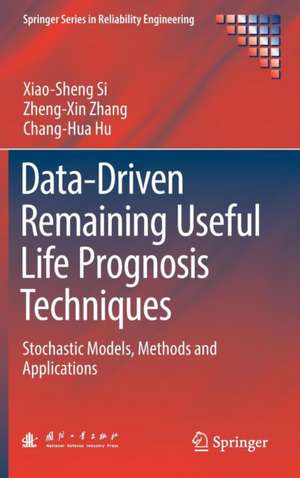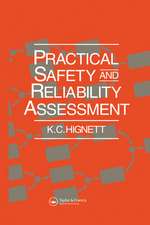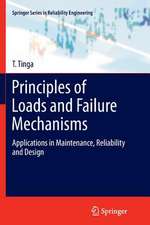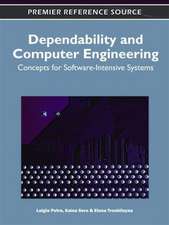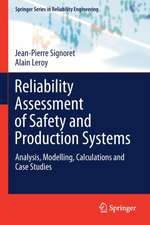Data-Driven Remaining Useful Life Prognosis Techniques: Stochastic Models, Methods and Applications: Springer Series in Reliability Engineering
Autor Xiao-Sheng Si, Zheng-Xin Zhang, Chang-Hua Huen Limba Engleză Hardback – 9 feb 2017
The emphasis of the book is on the stochastic models, methods and applications employed in remaining useful life prognosis. It includes a wealth of degradation monitoring experiment data, practical prognosis methods for remaining useful life in various cases, and a series of applications incorporated into prognostic information in decision-making, such as maintenance-related decisions and ordering spare parts. It also highlights the latest advances in data-driven remaining useful life prognosis techniques, especially in the contexts of adaptive prognosis for linear stochastic degrading systems, nonlinear degradation modeling based prognosis, residual storage life prognosis, and prognostic information-based decision-making.
| Toate formatele și edițiile | Preț | Express |
|---|---|---|
| Paperback (1) | 1115.14 lei 43-57 zile | |
| Springer Berlin, Heidelberg – 13 iul 2018 | 1115.14 lei 43-57 zile | |
| Hardback (1) | 1121.31 lei 43-57 zile | |
| Springer Berlin, Heidelberg – 9 feb 2017 | 1121.31 lei 43-57 zile |
Din seria Springer Series in Reliability Engineering
- 18%
 Preț: 1122.56 lei
Preț: 1122.56 lei - 20%
 Preț: 1277.89 lei
Preț: 1277.89 lei - 20%
 Preț: 987.32 lei
Preț: 987.32 lei - 18%
 Preț: 1406.66 lei
Preț: 1406.66 lei - 24%
 Preț: 1048.67 lei
Preț: 1048.67 lei - 20%
 Preț: 940.32 lei
Preț: 940.32 lei - 18%
 Preț: 952.09 lei
Preț: 952.09 lei -
 Preț: 313.32 lei
Preț: 313.32 lei - 18%
 Preț: 951.29 lei
Preț: 951.29 lei - 18%
 Preț: 947.02 lei
Preț: 947.02 lei - 15%
 Preț: 651.51 lei
Preț: 651.51 lei - 18%
 Preț: 1233.83 lei
Preț: 1233.83 lei - 18%
 Preț: 1233.06 lei
Preț: 1233.06 lei - 18%
 Preț: 952.89 lei
Preț: 952.89 lei - 18%
 Preț: 1234.94 lei
Preț: 1234.94 lei - 18%
 Preț: 1236.19 lei
Preț: 1236.19 lei - 18%
 Preț: 952.09 lei
Preț: 952.09 lei - 15%
 Preț: 635.65 lei
Preț: 635.65 lei - 20%
 Preț: 1274.57 lei
Preț: 1274.57 lei - 18%
 Preț: 1382.21 lei
Preț: 1382.21 lei - 15%
 Preț: 643.34 lei
Preț: 643.34 lei - 18%
 Preț: 1109.16 lei
Preț: 1109.16 lei - 15%
 Preț: 635.65 lei
Preț: 635.65 lei - 15%
 Preț: 654.62 lei
Preț: 654.62 lei - 18%
 Preț: 944.99 lei
Preț: 944.99 lei - 18%
 Preț: 953.65 lei
Preț: 953.65 lei - 18%
 Preț: 956.50 lei
Preț: 956.50 lei - 15%
 Preț: 644.95 lei
Preț: 644.95 lei - 18%
 Preț: 950.52 lei
Preț: 950.52 lei - 18%
 Preț: 1239.37 lei
Preț: 1239.37 lei - 15%
 Preț: 640.06 lei
Preț: 640.06 lei - 18%
 Preț: 956.69 lei
Preț: 956.69 lei - 18%
 Preț: 940.39 lei
Preț: 940.39 lei - 18%
 Preț: 948.92 lei
Preț: 948.92 lei -
 Preț: 389.70 lei
Preț: 389.70 lei - 18%
 Preț: 943.73 lei
Preț: 943.73 lei - 18%
 Preț: 1213.16 lei
Preț: 1213.16 lei - 18%
 Preț: 940.57 lei
Preț: 940.57 lei - 20%
 Preț: 985.03 lei
Preț: 985.03 lei - 18%
 Preț: 943.43 lei
Preț: 943.43 lei - 18%
 Preț: 1218.21 lei
Preț: 1218.21 lei - 18%
 Preț: 948.16 lei
Preț: 948.16 lei - 18%
 Preț: 948.92 lei
Preț: 948.92 lei - 18%
 Preț: 1678.16 lei
Preț: 1678.16 lei - 15%
 Preț: 638.43 lei
Preț: 638.43 lei
Preț: 1121.31 lei
Preț vechi: 1367.45 lei
-18% Nou
Puncte Express: 1682
Preț estimativ în valută:
214.57€ • 224.59$ • 178.58£
214.57€ • 224.59$ • 178.58£
Carte tipărită la comandă
Livrare economică 31 martie-14 aprilie
Preluare comenzi: 021 569.72.76
Specificații
ISBN-13: 9783662540282
ISBN-10: 3662540282
Pagini: 430
Ilustrații: XVII, 430 p. 104 illus., 84 illus. in color.
Dimensiuni: 155 x 235 x 25 mm
Greutate: 0.8 kg
Ediția:1st ed. 2017
Editura: Springer Berlin, Heidelberg
Colecția Springer
Seria Springer Series in Reliability Engineering
Locul publicării:Berlin, Heidelberg, Germany
ISBN-10: 3662540282
Pagini: 430
Ilustrații: XVII, 430 p. 104 illus., 84 illus. in color.
Dimensiuni: 155 x 235 x 25 mm
Greutate: 0.8 kg
Ediția:1st ed. 2017
Editura: Springer Berlin, Heidelberg
Colecția Springer
Seria Springer Series in Reliability Engineering
Locul publicării:Berlin, Heidelberg, Germany
Cuprins
From the Contents: Part I Introduction, Basic Concepts and Preliminaries.- Overview.- Advances in Data-Driven Remaining Useful Life Prognosis.- Part II Remaining Useful Life Prognosis for Linear Stochastic Degrading Systems.- Part III Remaining Useful Life Prognosis for Nonlinear Stochastic Degrading Systems.- Part IV Applications of Prognostics in Decision Making.- Variable Cost-based Maintenance Model from Prognostic Information.
Textul de pe ultima copertă
This book introduces data-driven remaining useful life prognosis techniques, and shows how to utilize the condition monitoring data to predict the remaining useful life of stochastic degrading systems and to schedule maintenance and logistics plans. It is also the first book that describes the basic data-driven remaining useful life prognosis theory systematically and in detail.
The emphasis of the book is on the stochastic models, methods and applications employed in remaining useful life prognosis. It includes a wealth of degradation monitoring experiment data, practical prognosis methods for remaining useful life in various cases, and a series of applications incorporated into prognostic information in decision-making, such as maintenance-related decisions and ordering spare parts. It also highlights the latest advances in data-driven remaining useful life prognosis techniques, especially in the contexts of adaptive prognosis for linear stochastic degrading systems, nonlinear degradation modeling based prognosis, residual storage life prognosis, and prognostic information-based decision-making.
The emphasis of the book is on the stochastic models, methods and applications employed in remaining useful life prognosis. It includes a wealth of degradation monitoring experiment data, practical prognosis methods for remaining useful life in various cases, and a series of applications incorporated into prognostic information in decision-making, such as maintenance-related decisions and ordering spare parts. It also highlights the latest advances in data-driven remaining useful life prognosis techniques, especially in the contexts of adaptive prognosis for linear stochastic degrading systems, nonlinear degradation modeling based prognosis, residual storage life prognosis, and prognostic information-based decision-making.
Caracteristici
Describes the basic data-driven remaining useful life prognosis theory systematically and in detail Includes a wealth of degradation monitoring experiment data, practical prognosis methods, and various decision-making applications that employ prognostic information Highlights new findings on remaining useful life prognosis techniques for linear/nonlinear systems Provides a complete picture of prognostic information-based decision-making applications Includes supplementary material: sn.pub/extras
